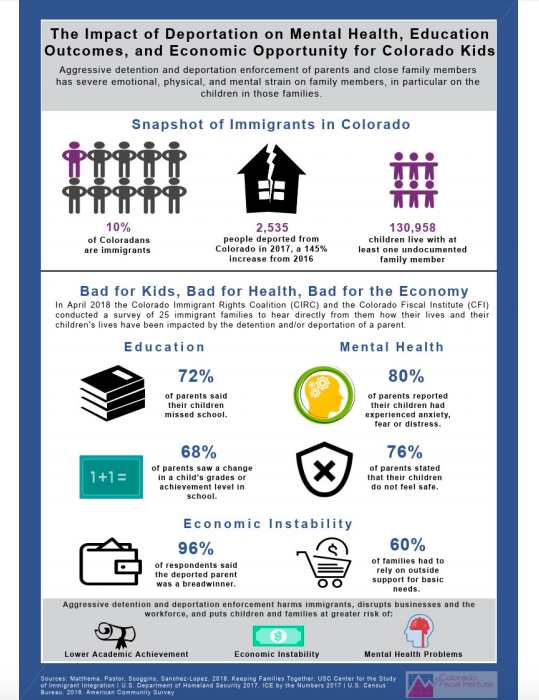
Meyer Law Office

Audio By Carbonatix
According to a new report, deporting and detaining immigrants in Colorado is causing severe emotional and economic strain on their family members, particularly children. This could negatively affect Colorado’s economy, according to the Colorado Fiscal Institute, a Denver-based nonprofit that analyzes fiscal and economic issues facing the state.
The report is based on surveys, administered with help from the Colorado Immigrant Rights Coalition, of 25 Colorado families with firsthand experience of losing at least one parent to deportation. The report notes that Colorado has about 276,589 residents, including 130,956 children, living with at least one undocumented family member.
As the Trump administration increases immigration enforcement – arrests are up 40 percent nationally under Trump compared to Obama’s last year in office – more immigrant families in Colorado are facing the reality of losing family members to deportation. (Immigration and Customs Enforcement hasn’t disclosed how many Coloradans have been deported under Trump in fiscal year 2018).

Colorado Fiscal Institute
“Over the past month we have heard the cries and seen the pain of the children inhumanely separated from their parents at the border. Today we bring to light the cries and pain of Colorado children that have been going on for years in our communities due detention and deportation,” says Gabriela Flora of the American Friends Service Committee, one of the report’s sponsors. “This report is important because it underscores, with survey data, what we have been hearing in the community, that detention and deportation negatively impacts children’s mental health, educational achievement and economic stability. The study also highlights the economic contributions of immigrant families.”
A vast majority of the report’s respondents – 80 percent – said that children in their households had experienced anxiety, fear and depression after their parent had been deported. In some cases, children feared that they might be deported themselves even when they’re U.S. citizens. The report includes anecdotes of children being afraid of knocks at their front door, assuming they’re from ICE agents. Some respondents said they lost trust in local law enforcement after a member of their household had been deported.
These anxieties have impacted school performance: 68 percent of parents surveyed said their students’ grades dropped after a parent had been deported. And 51 percent of children are receiving mental health support.
The Colorado Fiscal Institute notes that if the 51 percent statistic were applied statewide, it would cost the State of Colorado approximately $148 million to pay for mental health services.
Deportations are already straining finances; nearly all of the respondents said that the breadwinner of the family had been deported. In one case study, a mother of two whom the report’s authors called “Gaby” is $15,000 in debt after she paid $20,000 in legal fees for her husband, who was ultimately deported. She has taken a second job and is receiving support from her church, but she’s still struggling to make ends meet and pay off the debt incurred from legal fees.
More than half of the survey’s respondents said they are receiving some sort of financial aid from their community to help cope with the loss of a breadwinner. The Colorado Fiscal Institute notes that undocumented immigrants contribute $140 million a year in state and local taxes.
“Immigrant families are an important part of Colorado, and continued separation of families will hurt the state economically,” says Colorado Fiscal Institute policy analyst Esther Turcios. “From an additional $7 million from our already underfunded school districts to hire more school psychologists, to nearly $150 million in projected increased mental health care costs for children of deported or detained parents, Colorado can afford neither the financial nor the social impacts of aggressive detention and deportation policies.”
Read the Colorado Fiscal Institute report here.